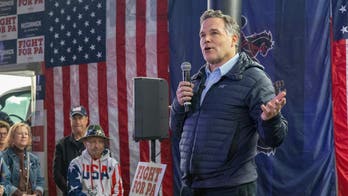
VATICAN CITY, VATICAN - MARCH 15: (EDITORIAL USE ONLY - STRICTLY NO COMMERCIAL OR MERCHANDISING USAGE - BOOKS OUT, BROADCAST OUT, All image rights and copyrights reserved to the photographic Service of L'Osservatore Romano). IMAGE IS NOT LICENSED FOR USAGE BEYOND 60 DAYS OF CREATE DATE. Pope Francis meets with the full College of Cardinals, electors and non-electors in the Clementine Hall of the Apostolic Palace, on March 15, 2013 in Vatican City, Vatican. The inauguration mass of Pope Francis, the first ever Latin American Pontiff, will be held on March 19, 2013 in Vatican City. The Pope met with cardinals earlier on his second day as Pontif. (Photo by Servizio Fotografico L'Osservatore Romano via Getty Images) (2013 L'Osservatore Romano)
Pope Francis is scheduled to speak before a joint session of Congress on Sept. 24, right around the time critical votes are expected to take place on the Iran nuclear agreement.
Political observers believe the pope may express support for the deal – in stark contrast to Israeli Prime Minister Benjamin Netanyahu’s speech in March before Congress in which he denounced the Iran accord as a “bad deal” that “would all but guarantee” that the Middle Eastern nation would obtain nuclear weapons.
Stephen Colecchi, a top official with the U.S. Conference of Catholic Bishops, told Politico that he believes the pope would speak about the Iran deal in hopeful tones.
Colecchi predicts the pope will frame the nuclear agreement in a positive way “whether to speak words of encouragement for Congress to reconsider if the situation warrants that” or “gratitude if indeed Congress upholds the agreement.”
In July, the Vatican said that an Iran deal with the global powers was viewed “in a positive light” by the Holy See.
“It constitutes an important outcome of the negotiations carried out so far, although continued efforts and commitment on the part of all involved will be necessary in order for it to bear fruit,” a Vatican spokesman said.
During an Easter Mass at St. Peter’s Square, Pope Francis expressed support for the Iran deal, saying it would be "a definitive step toward a more secure and fraternal world."
House Speaker John Boehner announced that the pope would visit Congress during his trip to the U.S. He said he was unsure what the pope would say.
When asked what topics the pope may mention in his address, Boehner recently said, “Well, listen, there’s one thing we know about this pope: He’s not afraid to take on the status quo or not afraid to say what he really thinks.”
Congress, which has a Republican majority, is expected to vote against the Iran nuclear agreement days before the pope arrives in the Unites States. An attempt at a filibuster could throw things off schedule, Politico said.
If Congress votes down the deal, President Barack Obama could veto it.
The Obama administration has expressed confidence that the deal will survive Congress.
The administration has said the deal is the best it could reach, and that if Congress votes against it, Iran will only pursue a nuclear program more aggressively.
Some have said the pope, who has not shied away from weighing in on the most controversial issues of the day, should not take on the Iran nuclear deal.
Colecchi disagrees.
“Concern for the poor and concern for peace are profoundly spiritual issues,” Colecchi said.
“These are not optional issues. These are at the heart of the gospel.”
Like us on Facebook




